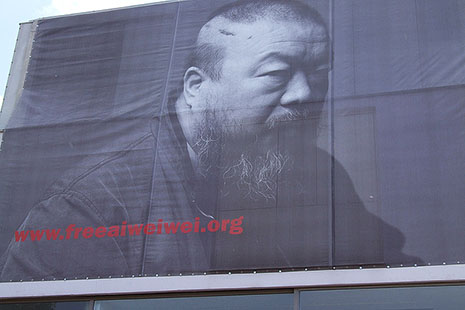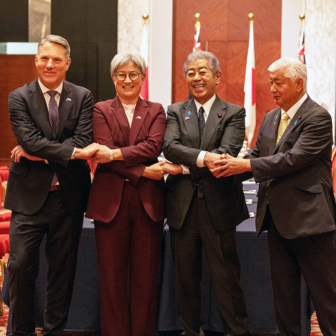AN EXHIBITION showing at Somerset House in London and the Pulitzer Fountain in New York features the heads of the twelve animals that make up the Chinese zodiac. They are replicas of statues destroyed by Western troops when they sacked the Yuanmingyuan – the old summer palace in Beijing – as they marched into the Chinese capital at the end of the Second Opium War. To most Chinese, the Yuanmingyuan, which is still preserved in its ruined state, is a vivid symbol of China’s past humiliation by foreign powers.
For a Chinese artist to recreate these statues and install them in a building redolent of the heyday of the British Empire might seem like a bold patriotic gesture, something the government in Beijing would be quick to praise. Yet there were no Chinese officials making speeches at the openings of Ai Weiwei’s shows in London and New York in April. In fact the artist was detained by police at Beijing airport at the beginning of April and officials say only that he is under investigation for alleged “economic crimes.”
Ai Weiwei achieved worldwide fame as the “artistic consultant” to the stunning Bird’s Nest stadium built for the Beijing Olympics in 2008. But the big, burly, bearded artist, who lived for many years in New York, has always been an iconoclast, willing not only to mock Western cultural arrogance but also to smash Chinese cultural relics – including vases dating from the Han dynasty 2000 years ago – as part of his conceptual art pieces. In recent years he has criticised official corruption and, increasingly, China’s entire political system. Nevertheless, his arrest came as a shock to many of the country’s artists and intellectuals, and has been seen as further evidence that the Chinese government is taking an increasingly hard line towards its critics.
Moving against Ai sends a strong statement partly because of his family’s close connections with China’s Communist elite, which many had believed rendered him untouchable. His father, Ai Qing, was a prominent left-wing poet and intellectual of the 1930s who became an early supporter of the Communist Party. Although he was purged by Chairman Mao in the 1950s and spent years in internal exile in the countryside, he was rehabilitated and returned to prominence after the Cultural Revolution.
Ai Weiwei’s international profile over recent years was also thought to give him some insulation. Not only did he have major shows, such as his recent Sunflower Seeds installation at London’s Tate Modern, but he also appeared on learned panels, and received honorary doctorates and visiting professorships from Western universities.
At a time when the Chinese government is obsessed with improving its international image and promoting what it likes to call its “soft power” – spending billions on founding Confucius Institutes to teach Chinese language and culture, and expanding its media into the global, English-language market in an attempt to counter foreign media coverage – surely it wouldn’t want to score a massive own goal by arresting Ai?
But there’s evidence that at least some of those calling the shots in China today are scarcely concerned about their country’s international image. Over recent years, China’s internal security establishment seems to have gained growing influence over policy. It’s a trend that has been evident since the 2008 Olympics, when security was so tight that many felt the atmosphere of the games suffered. Fears of social unrest as China’s economy slowed, albeit fairly briefly, following the financial crisis of 2008 might also have boosted the security establishment; and official paranoia grew when a group of intellectuals, led by the dissident writer Liu Xiaobo, attempted to found a pro-democracy movement called Charter 08. The 2010 World Expo in Shanghai was also notable for the large numbers of military police who not only marched around the Expo site but were also stationed in pairs at every entrance to every subway station in the city for the entire six months of the event.
The awarding of the Nobel Peace Prize to Liu Xiaobo in late 2010 seemed to heighten Beijing’s anxieties. The government, grown used to the international community soft-pedalling human rights as it sought Beijing’s financial assistance to shore up its ailing economies, was shocked by what it saw as the most overt foreign attempt to interfere in its domestic affairs for many years. The outbreak of revolutions in North Africa and the Middle East, followed by calls, mainly from abroad, for similar protests in China, fuelled its insecurity and led to the strikingly tough line the Chinese authorities took on foreign journalists who tried to report from the locations that had been designated for these “Jasmine protests.”
Journalists who reminded the government of the rules it introduced before the Olympics, which give foreign media the right to report from anywhere in the country, were told by a spokeswoman for China’s foreign ministry that they should “not use the law as a shield.” It was a revealing quote – and very much in keeping with the crackdown on lawyers in recent years.
As usual in China, there are contradictory signs as well. Some of the country’s more liberal media organisations have recently made bold criticisms of corruption, and even the official People’s Daily recently quoted Voltaire on the importance of freedom of speech. Prime Minister Wen Jiabao also continues to emphasise the need for “independent thinking” and political reform – though Chinese media were at one point told not to report his comments. It’s all prompted speculation about high-level political splits, as different factions jostle for influence ahead of the retirement of Wen Jiabao and President Hu Jintao in 2012–13.
Chinese politics is often characterised as being made up of periods of either hot or cold winds, which bring greater openness or greater conservatism respectively. It may be that we’re at the start of a long cold front. •




